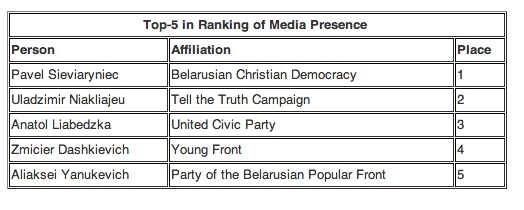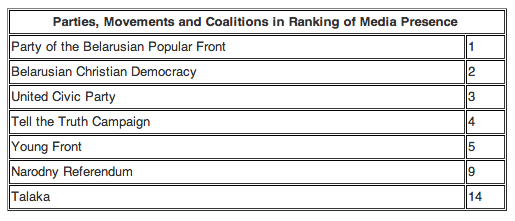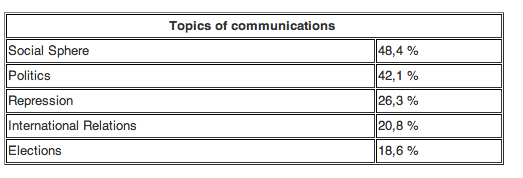Solidarity with Ukraine, Engagement with Central Europe – Belarus Foreign Policy Digest

Belarus has made a few gestures of support towards Ukraine, a move which has put it at odds with Russian policy.
All of this is unfolding during a time when working relations between Belarus and several Central European countries are improving both economically and politically.
A visit from UNESCO's Director-General to Minsk, on the other hand, did not lead to any new high-profile cooperation projects.
Display of Solidarity with Ukraine
The Belarusian authorities have carefully avoided any public criticism of Russia's aggression against Ukraine. Nevertheless, Russia has apparently failed to secure support from its Belarusian ally. Foreign Minister Makei spent two days in Moscow meeting with top Russian officials and Putin called Lukashenka on 10 April. However, official communiques have to make any mention of the most controversial topic – Ukraine. Translated from diplomatic language, this signifies that no agreement on the topic has been reached.
Meanwhile, the Ukrainian authorities have enjoyed quite a few gestures of support. On 13 April, in his interview with the Russian TV channel NTV, Lukashenka spoke "strongly against the federalisation" of Ukraine and was in favour of an "integral monolithic unified country". He also described both Acting President Turchinov and the Verkhovna Rada as "absolutely legitimate". The two presidents spoke again on 24 April.
Lukashenka denied claims that the US was the ultimate cause of the events in Ukraine and blamed Yanukovych for shedding blood there Read more
Lukashenka denied claims that the US was the ultimate cause of the events in Ukraine and blamed Yanukovych for shedding blood there. All these statements run contrary to the position Russia is quite stubbornly promoting in mass media and at international forums.
Belarus is stepping up its support for Ukraine and is providing more than just rhetoric. During his visit to an aircraft repair plant in Baranavichy, Lukashenka instructed his government to strengthen cooperation with Ukraine's defence industry. Ukrainian manufacturers of military equipment have had to curtail their cooperation with Russia. It is believed, then, that cooperation with Belarus will help the industry live through these hard times.
In Kyiv, Belarusian ambassador Valiancin Vialichka met with the Ukrainian Minister of Agriculture and Food Ihor Shvaika. Both countries are keen to expand their exports of agricultural goods. The fact the Mr. Shvaika is a prominent member of the right-wing Svoboda Party much hated by the Russian establishment adds zest to the situation.
Meanwhile, the domestic media has insistently questioned foreign ministry officials about Belarus' aspiration to become a mediator in Russian – Ukrainian relations. Although they have stated their readiness to play such a role if requested by both parties, the Belarusian authorities have repeatedly denied any such overtures in this regard.
This, of course, seems to point to a simple truth. Moscow does not want any negotiations. Kyiv, for its part, prefers to have the EU and the US as intermediaries. Being aware of this, Minsk does not want to lose face by advancing an unsolicited initiative.
Polish PM Donald Tusk called Lukashenka for the first time since the brutal suppression of protests in December 2010 in Minsk Read more
Due to special nature of Belarus' relations with Russia, the country's stance in this crisis remains of interest to the West. This may have been what motivated Polish PM Donald Tusk to call Lukashenka for the first time since the brutal suppression of protests in December 2010 in Minsk. Shortly after the story broke, this conversation mysteriously disappeared from the BelTA's (a state-controlled news agency) news feed.
Warming up to Central Europe
The conversation between Lukashenka and Tusk was yet another change in the ongoing thaw in relations between Belarus and some EU members. Central European countries, and especially the Visegrad Group, have set the tone in this process.
Belarus and the Czech Republic discussed cooperation in agriculture within the framework of an intergovernmental working group.
Belarusian Deputy Foreign Minister Alena Kupchyna held several high-level meetings with the executive and legislative branches of government in Bratislava. She visited Slovakia to lead the Belarusian delegation at another round of political consultations between the foreign ministries. Two weeks earlier, Belarus and Slovakia held consultations on consular matters.
Before her visit to Slovakia, Kupchyna was in Ljubljana to hold political consultations with her Slovenian counterpart. That visit had an important economic component as well. The two countries are preparing for the next meeting of a bilateral intergovernmental commission on trade and economic cooperation and a future business forum.
The Development Bank of Belarus and Eximbank Hungary Plc. signed a mid-term loan agreement in Budapest. Eximbank will finance Hungarian imports to Belarus up to a value of $10m.
Overall, Belarus has succeeded in establishing rather positive and pragmatic relations with the Hungarian conservative government.
The meeting of the Belarusian-Polish working group on trade and investment held on 2 April was yet another important event Read more
The meeting of the Belarusian-Polish working group on trade and investments held on 2 April was yet another important event in the nation's developing ties with Central European countries. The group had not meet for five years despite Poland's status as the fifth largest investor in Belarus. Two deputy ministers represented the Polish side in Minsk.
Integrating its power grid with its European neighbours was one of the most important topics of discussion at the meeting. Belarus has consistently sought to strengthen energy cooperation with its neighbours in order to mitigate its energy dependence on Russia.
The Central European countries, together with the Baltic States, hold the strongest anti-Russian sentiments among all of the EU member countries. The improvement of relations between Belarus and these countries run counter to Russia's geo-strategic interests.
Advocating for Traditional Family Values
The protection of traditional family values has become a true priority for Belarusian diplomacy. Belarusian diplomats use every single occasion they have to promote this concept as part of its the multilateral agenda.
Belarusian diplomats use every single occasion to promote the concept of a 'traditional family' Read more
In April, they rolled out a big gun. Deputy Foreign Minister Valentin Rybakov went to New York to raise this topic at a meeting of the UN Open Working Group on Sustainable Development Goals. Usually, the diplomatic staff based in New York or mid-level officials from the capital represent member states at meetings of this level.
Later on, a junior official at the Belarusian Ministry of Labour raised this subject at the 47th session of the Commission on Population and Development.
However, Belarus is still failing to reverse the dominate liberal trend, which downplays the role of the family as the basic social institution. Most countries prefer to focus on other social issues and render little support to these kinds of conservative values.
Education, Science and Culture
This year, Belarus is celebrating the 60th anniversary of its UNESCO membership. Although they joined UNESCO together with Ukraine, Minsk and Moscow held a series of commemorative events in Paris without Kyiv. The "Slavic brotherhood", often displayed at multilateral organisations, has now fallen prey to the ongoing Russian-Ukrainian conflict. The joint commemoration of the Chernobyl anniversary will necessarily become its next victim.
A visit to Belarus by UNESCO's Director-General, Irina Bokova, became the celebrations' focal point. Irina Bokova met Alexander Lukashenka and Vladimir Makei. She also attended the ceremonial session of the National Commission for UNESCO.
All parties praised ongoing cooperation between Belarus and UNESCO. However, neither Irina Bokova nor her Belarusian colleagues unveiled any forthcoming high-profile projects.








